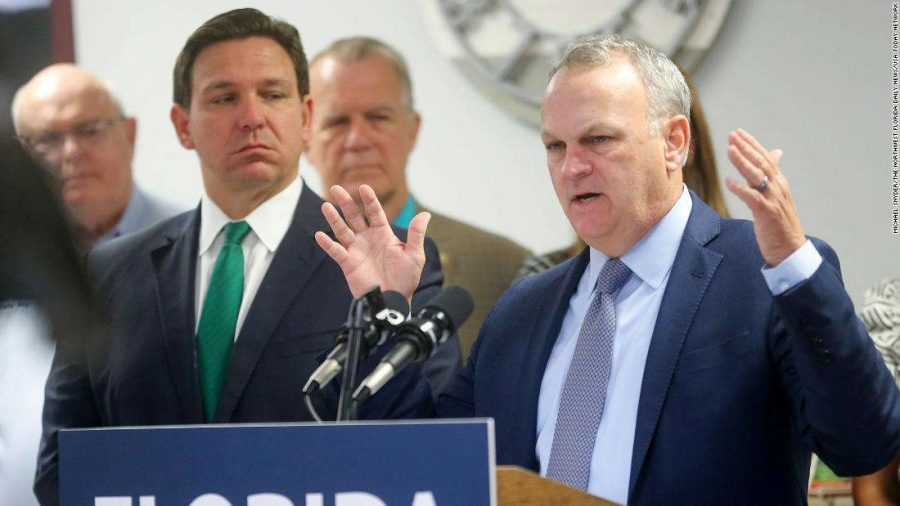Florida Rejects 54 Math Textbooks
Florida Department of Education Commissioner Richard Corcoran discusses the impact of Bill SB 1048 alongside Florida Governor Ron DeSantis during a morning press conference at Florosa Elementary School on March 17, 2022.
April 18, 2022
The Florida Department of Education has rejected 54 math textbooks, out of the initial 132 of the textbook submissions. This list of rejected books makes up approximately 41% of submissions, which is the most in Florida’s history. Books submitted for grades K-5 received the highest number of rejections, amounting at 71%. Grades 6-8 had 20% of the materials rejected, and 35% of materials for grades 9-12 were also rejected.
On April 15th, a news release from the department entitled “Florida Rejects Publishers’ Attempts to Indoctrinate Students,” said some of the books had been rejected for failure to comply with the state’s content standards, Benchmarks for Excellent Student Thinking (Best). 21% of the books were disallowed “because they incorporate prohibited topics or unsolicited strategies,” including critical race theory (CRT). Department officials disapproved an additional 11 books “because they do not properly align to Best Standards and incorporate prohibited topics or unsolicited strategies, including CRT.”
Critical race theory has become politicized in recent years, with opponents arguing the area of study is based on Marxism and is a threat to the American way of life. But scholars who study it say critical race theory explores the ways in which a history of inequality and racism in the United States continues to impact American society today. It has been a highly controversial topic, and this isn’t the first-time instructional material has been rejected because of it.
In fact, Florida banned the teaching of critical race theory in schools back in June 2021. At the time, Governor Ron DeSantis said that allowing critical race theory in schools would teach children that “the country is rotten and that our institutions are illegitimate.” According to the ban, instruction in schools must be “factual and objective.” It specifically prohibits “theories that distort historical events”, including “the teaching of Critical Race Theory, meaning the theory that racism is not merely the product of prejudice, but that racism is embedded in American society and its legal systems in order to uphold the supremacy of white persons.” The state has also banned teaching material from the 1619 Project, the New York Times’ Pulitzer Prize-winning project to reframe American history around the date of August 1619, when the first slave ship arrived on America’s shores.
“It seems that some publishers attempted to slap a coat of paint on an old house built on the foundation of Common Core, and indoctrinating concepts like race essentialism, especially, bizarrely, for elementary school students,” said Governor Ron DeSantis. “I’m grateful that Commissioner Corcoran and his team at the Department have conducted such a thorough vetting of these textbooks to ensure they comply with the law.”
The release does not list the titles of the books or provide any extracts to offer reasons why the books were removed. The announcement follows a series of hardline measures by Republicans in the state to alter teaching in schools as conservatives thrust the issue of critical race theory into the country’s ongoing political culture wars.
Commissioner of Education Richard Corcoran says, “We’re going to ensure that Florida has the highest-quality instructional materials aligned to our nationally recognized standards. Florida has become a national leader in education under the vision and leadership of Governor DeSantis. When it comes to education, other states continue to follow Florida’s lead as we continue to reinforce parents’ rights by focusing on providing their children with a world-class education without the fear of indoctrination or exposure to dangerous and divisive concepts in our classrooms.”


